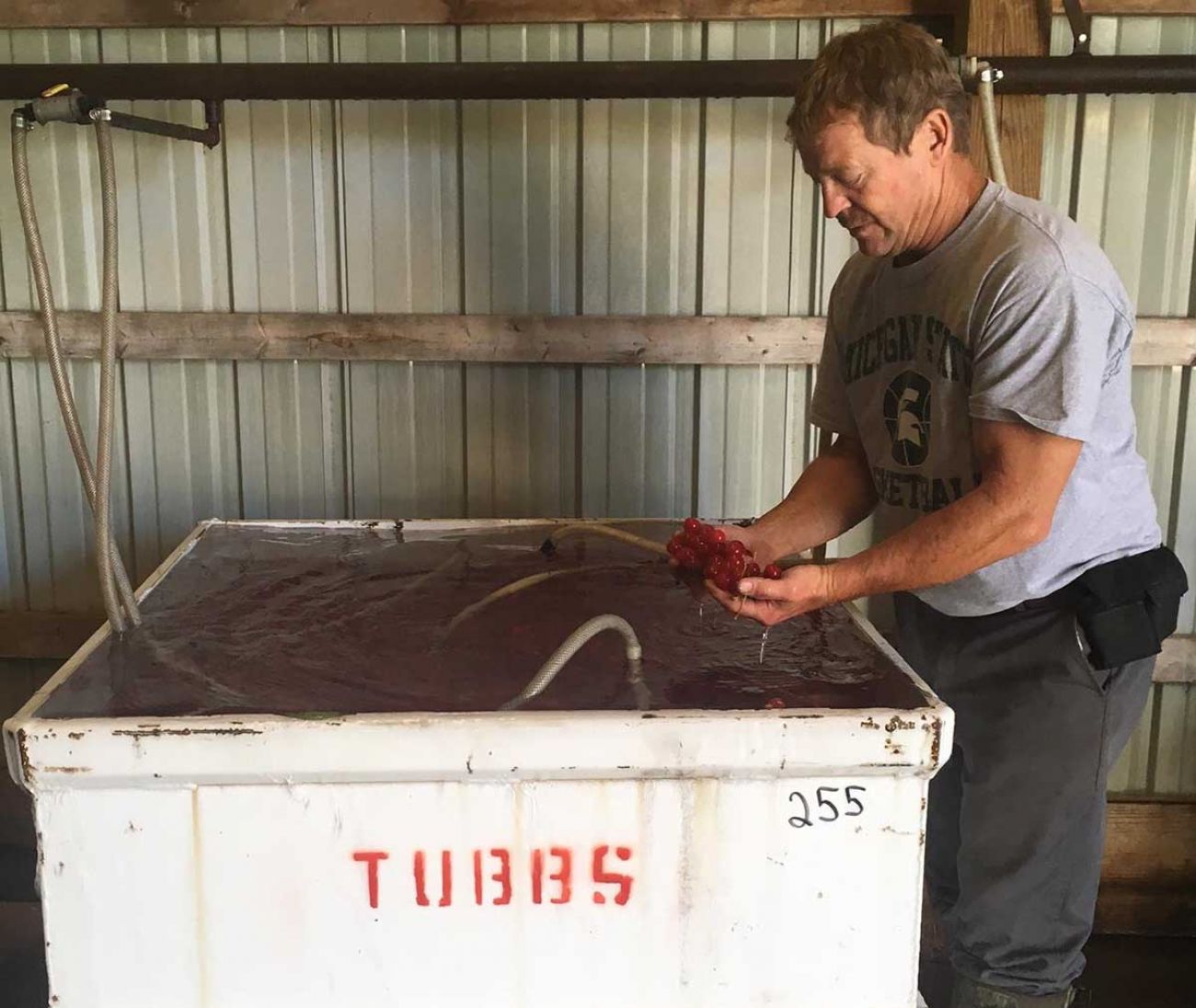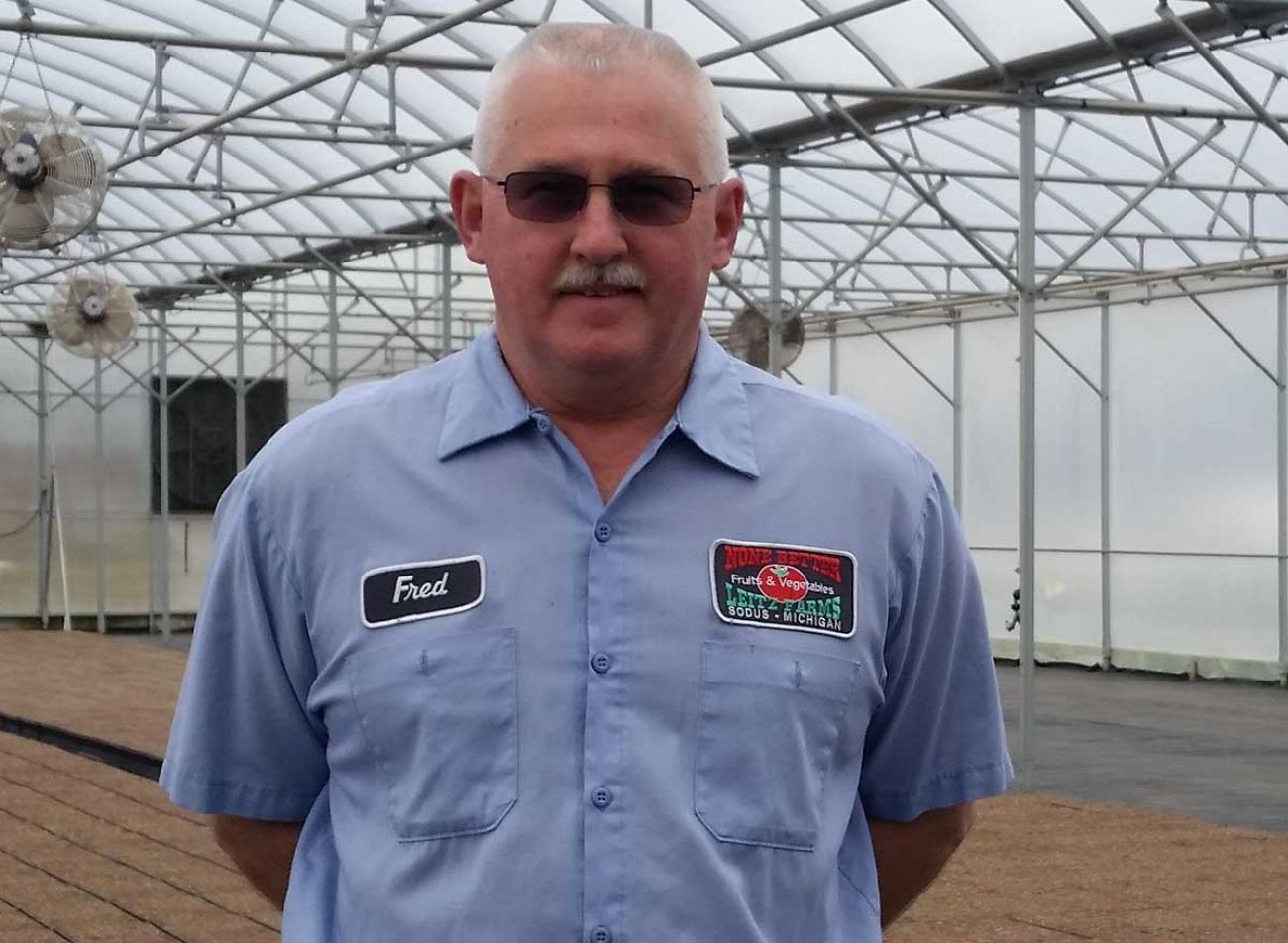With fewer farmhands, Michigan farmers more willing to buy worker visas

About 80 miles northwest of Grand Rapids, fruit and vegetable grower Tim Tubbs was on edge this spring as harvest time approached for the asparagus crop.
Most years, Tubbs, who works the 900-acre farm with his father, Fred, attracts at least a dozen more workers than are needed. They provide skilled hand labor to harvest the cherries, asparagus, peaches and apples; work that demands at least a couple dozen seasonal workers.
This year, that’s exactly what Tubbs got: 24. “We just got by,” he said.
Tubbs said undocumented workers, many from Mexico, were too worried about strict border enforcement to risk a farm job in Michigan. “They are deathly afraid to even travel,” he said. “It's a lot to do with immigration.”
As Bridge first chronicled in February, farmers across Michigan feared that President Trump’s aggressive crackdown on illegal immigration would mean not enough hands for the harvest when the weather warmed.
Tubbs and other farmers now say they are resigned to paying extra to bring workers to the U.S. legally. Next year, Tubbs said, he may use a federal guest worker program that is gaining traction among Michigan farmers seeking assurance their workforce will show up.
“I think we are going to be concerned that we will get our crop harvested,” he said. “I think that we are going to have to do it.”
So far this year, nearly 6,000 agricultural visas have been approved for Michigan farmers – more than quadruple the number approved in 2014, and more than 10 times the 500 visas approved in 2013.
Farmers turning to visas
The number of H-2A guest agricultural workers approved in Michigan has risen more than 10-fold since 2013:
- 2008: 442
- 2009: 493
- 2010: 289
- 2011: 251
- 2012: 344
- 2013: 500
- 2014: 1,302
- 2015: 2,301
- 2016: 4,044
- 2017: 5,967 (through July 1)
Source: Michigan Farm Bureau
Known as H-2A, the program brings workers – predominantly from Mexico – to work on U.S. farms for no more than a year. After that, they must return to their home country. Farmers pay their visa fees and transportation expenses both ways. They also provide housing and agree to pay a specified wage. In Michigan, it's set at $12.75 an hour for 2017. When all expenses are figured in, farmers estimate workers cost about $17 an hour.
But a government farm official said the extra cost and bureaucracy of securing an H-2A seem to be a worthwhile tradeoff for farmers, when they consider the alternative.
“You ask a lot of the growers why they are switching to H-2A. They won't say I'm switching because it is easy to work with. They won’t say because it’s cheap,” said Kevin Robson, a horticulturist with the Michigan Farm Bureau.
“Now, their biggest worry is getting (crops) off the trees.”

Robson said he talked to one apple grower who said he had no problem growing perfect fruit. But, the grower told him, “If I can't get it harvested, it isn't worth anything.'”
Businesses in other seasonal industries in the state are also scrambling to find workers.
Some employers on Mackinac Island say they are struggling to fill hospitality jobs that open during the summer tourist season. They rely on a similar program – H-2B – that provides foreign workers in the seafood, tourism, landscaping and other seasonal industries. Under pressure from industry groups, the Trump administration last week added another 15,000 H-2B visas nationally for the remainder of the fiscal year.
Mackinac Island Carriage Tours applied for about 20 H-2B slots as part of its seasonal workforce of 350. But the carriage company never got them – because the program reached its cap before the positions could be authorized.
“It’s a political issue and it shouldn’t be. It’s more of a small-business issue,” Brad Chambers, the company’s treasurer, told the Detroit Free Press in June.
New cost of farming
According to a 2014 report by the American Farm Bureau Federation, undocumented workers comprise fully half of hired U.S. farm workers. While there is no calculation specific to Michigan, the state's agricultural seasonal workforce numbers about 45,000.
No other industry has such a high share of undocumented workers.
In a state that ranks at or near the top in the nation in cherry and blueberry production – and where fruit and vegetables account for a $1.4 billion economic impact – being unable to fill farm jobs during the harvest is no small matter.
Berrien County grower Fred Leitz turned to the H-2A program a couple years ago, and said he now fills most of his work force of 225 with guest workers. With 700 acres of cucumbers, cantaloupe, tomatoes, apples and blueberries on his farm in the southwest corner of Michigan, Leitz has plenty at stake every harvest season.

“I know they are legal,” Leitz said of his H-2A workers. “If ICE (U.S. Immigration and Customs Enforcement) comes in at least I know I still have workers.”
Thus far, Leitz said: “We are doing okay. We have enough workers.”
While mass arrests of migrant farm workers might not be common, that specter is every grower's nightmare: Their work force could disappear overnight.
In February, ICE agents in Oregon stopped two buses transporting Latino farm workers and detained 11 men who were then subject to deportation proceedings. The men were on their way to work harvesting flowers when they were apprehended.
In April, ICE conducted an immigration raid at a Pennsylvania mushroom farm that resulted in the arrest of 12 immigrant workers. According to newspaper accounts, they were booked and put in custody to face deportation.
Michigan growers say it's impossible to know for certain if workers are undocumented, since employers are required by law to accept a variety of ID’s for employment, such as a Social Security card, birth certificate and driver's license. They can easily be forged.
By law, farmers who employ H-2A workers are required to advertise their job openings in local newspapers to assure that Americans get first crack at the jobs. But they say few locals bother to show up.
“We have (Americans) that want to drive tractors,” Leitz told Bridge in February. “But nobody wants to harvest. Working in fields with hot or cold weather is not for everybody.”
Selling farmers on visas
In 2014, the Michigan Farm Bureau spun off a for-profit company called Great Lakes Ag Labor Services to help farmers navigate the complex H-2A process. It worked with four farms the first year, 10 in 2015, 21 in 2016 and some three dozen this year. It helped import 705 guest workers in 2016 and more than 1,200 this year.
“We’ve been doubling every year,” said Eligio Larraga, sales and field representative for Great Lakes. “When growers call us or come to us, it’s because they are struggling to find workers.”
Larraga meets with interested growers, explains how the program works and helps with everything from its maze of paperwork to how to advertise job openings. While H-2A workers are more expensive than undocumented migrant workers, Larraga said they give growers something hard to put a price on: peace of mind.
“If you use this program there is not going to be such a thing as a shortage of workers. There are literally thousands of workers in Mexico that would like the opportunity to (legally) work in the United States.
“They can make enough money to take care of their family for an entire year. They can make in a day what they make in a week there,” Larraga said.
But as long as undocumented labor continues to be a large part of Michigan’s farm work force, Larraga conceded the H-2A program alone will not solve the farm shortage.
“It’s not the solution. But it’s the only legal program out there for workers.”
In the meantime, Larraga said he’s not entirely surprised that some migrant workers are still coming to Michigan despite the shadow of deportation.
“If I was undocumented, I would be concerned. The fear is still there. But the workers don’t know anything else. They still have to work. They have to make money. They have to feed their family.”
A few months back, blueberry grower Bill Fritz worried he might lack the workers to pick his crops.
He's not worried now.
“Everything is going good,” said Fritz, who farms 350 acres of blueberries in Allegan and Van Buren counties. At peak harvest time, he employs some 700 migrant workers – and he was expecting more earlier this month as the New Jersey blueberry crop wound down.
“Everyone is here,” he told Bridge. “They all showed up.”
See what new members are saying about why they donated to Bridge Michigan:
- “In order for this information to be accurate and unbiased it must be underwritten by its readers, not by special interests.” - Larry S.
- “Not many other media sources report on the topics Bridge does.” - Susan B.
- “Your journalism is outstanding and rare these days.” - Mark S.
If you want to ensure the future of nonpartisan, nonprofit Michigan journalism, please become a member today. You, too, will be asked why you donated and maybe we'll feature your quote next time!

